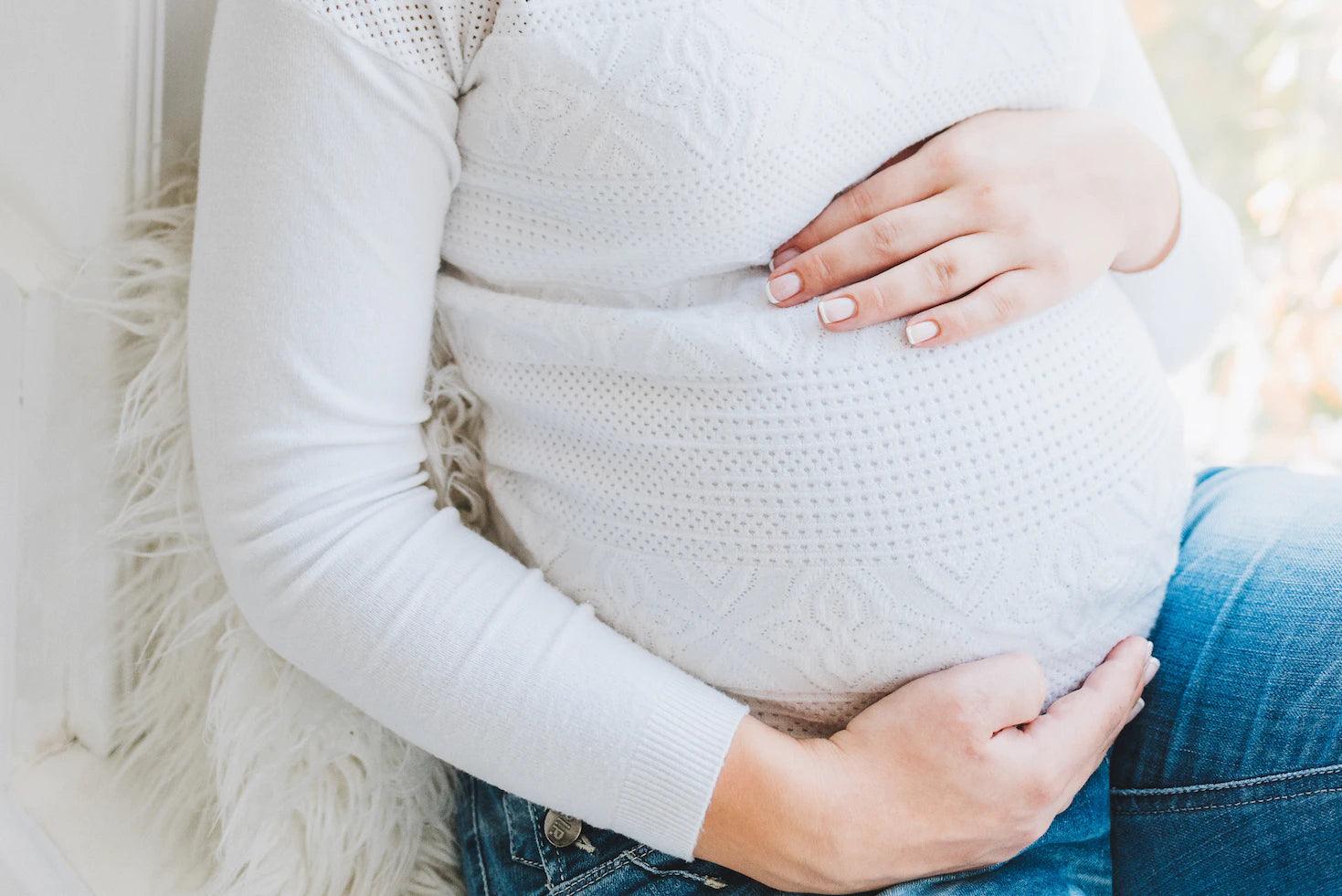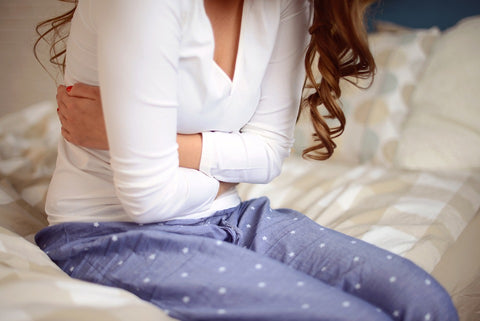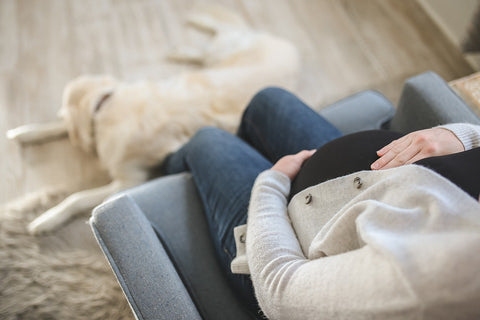Back Pain During Pregnancy: Reasons & Treatments
•Posted on October 13 2022

Becoming a mother is not an easy decision. Along with the dramatic increase in happiness comes various discomforts, and back pain is a common symptom. Most pregnant women suffer from back pain, especially in the middle and late stages of pregnancy, as the fetal baby grows, the bulging belly puts more and more weight on the lower back, and the symptoms of back pain become more and more obvious. This is related to the special physiological changes during pregnancy, plus the bad daily habits also largely exacerbate this pain.
Often pregnant women are troubled by back pain, even though back pain is normal during pregnancy, more lying down and resting makes the pain worse. What causes back pain during pregnancy? Is there a way to relieve it?
We have collected the main symptoms of back pain during pregnancy and the factors affecting them to find further solutions for back pain. The article can provide pregnant women with effective ways to relieve back pain.
Table of content:
- Seven causes of back pain during pregnancy
- Common symptoms of back pain during pregnancy
- Four ways to relieve back pain during pregnancy
Seven causes of back pain during pregnancy
Back pain in pregnant women is a common occurrence, and most pregnant women suffer from varying degrees of back pain. There are many reasons for this condition, the six main ones being.
1. Forward center of gravity
This is the physiological reason why back pain occurs during pregnancy. Back pain during pregnancy is often concentrated in the middle and late pregnancy, especially after 25 or 26 weeks of pregnancy, when the uterus gradually increases, the abdomen bulges forward, the center of gravity shifts forward when standing, and in order to keep the balance of the body, the pregnant woman's body tilts backward, the center of gravity shifts backward and falls on top of the hips, and the weight of the pregnant woman's upper body is borne by the lumbar spine and the muscles of the lumbar region. With this special physiological change, standing for a little longer, the back muscles and ligaments of pregnant women will be overly strained and suffer from low back and sacral pain.
2. Hormonal effects
After pregnancy, in order to facilitate the growth and development of the fetus, the secretion of estrogen and progesterone in the body of pregnant women will rise significantly. This not only makes the pelvic joint ligaments of pregnant women become lax, but also affects the strength support of the spinal pelvis, making the curvature of the lumbar vertebrae increase, which is one of the reasons why pregnant women tend to feel back pain in the middle and late stages of pregnancy.
3. Calcium deficiency
The growth and development of the fetus requires calcium supplementation. Especially in late pregnancy, the fetus' demand for calcium increases, and if the supply is insufficient, the fetus will compete for the nutrients in the pregnant woman's body. When a pregnant woman has back pain it is possible that her body is reminding you that it is time to take calcium supplements.

4. Cold exposure
When the body is cold, it will be easy to have joint pain or back pain. Pregnant women may suffer from back pain due to cold, whether they blow cold air in the air-conditioned room in summer or do not pay attention to keeping warm when it is cold.
5. Body image problems
Many people have postural problems in their daily lives, and after pregnancy, back pain can be significantly aggravated by the special physiological changes during pregnancy. Therefore, we need to pay attention to maintaining the correct posture in our daily standing.
6. Bending over to do heavy housework
As pregnancy progresses, the developing fetus and enlarged uterus can put a lot of pressure on the spine of pregnant women. Therefore, pregnant women should avoid bending over as much as possible to avoid putting too much weight on the lower back. In addition, during pregnancy to pay attention to rest, do not make the body overworked. Frequent prolonged standing, squatting and sitting can lead to lumbar muscle strain and induce back pain.
If you need to pick up something from the ground, you should also be careful not to bend over directly, first feet apart, toes slightly outward or pointing straight ahead, keep the spine extended state bend the knees and distribute the weight of the whole body to the thighs, slowly squatting before picking up items.
7. Lie on your back and get up directly from bed
The act of getting up is difficult for many pregnant women and requires the help of another person. But getting up directly from the supine position can cause damage to the muscles of the lower back.
Getting up from bed should be done in a slow and orderly manner. You should first turn on your side and use your hands to help support your upper body to avoid tension in your abdominal muscles. Before getting up from supine position, turn your body in bed to the side, and then support your body with your elbow and arm to help slowly sit up and stand up.
Common symptoms of back pain during pregnancy
Low back pain during pregnancy usually presents with signs such as back pain and weakness, a heavy back, and vague pain. Low back pain during pregnancy is not experienced by everyone. However, most people may begin to experience back pain after more than 40 days of pregnancy. About 50% to 85% of pregnant women will experience major or minor back pain troubles during pregnancy. Back pain during pregnancy is a normal physiological phenomenon that is more difficult to avoid. However, there are still many steps that pregnant women can take to relieve back discomfort and prevent it from becoming a long-term problem.

Four ways to relieve back pain during pregnancy
1. Daily Precautions
Go to work
Put a small cushion on the chair in the office, so that when sitting down the lumbar support. Do not sit still for too long, every quarter of an hour to get up and walk properly.
Get your vitamins in time
Excessive weight gain during pregnancy is an important cause of back pain. Pregnant women are advised to eat a balanced diet and not to gain weight too much or too fast. During pregnancy, due to the rapid development of the fetus, more minerals and vitamins are needed, if the pregnant woman does not have enough, it will cause some discomfort.
Calcium and vitamin D deficiency in the body can easily cause back pain. To supplement calcium and vitamin D, pregnant women should drink more milk, get at least 2 hours of outdoor sunlight every day, and take calcium tablets after the fourth month of pregnancy. If a pregnant woman is deficient in calcium, she will also be deficient in calcium after delivery, resulting in loose teeth, back pain and leg pain.
Stay warm
Pregnant women should keep their feet and waist warm, preferably with socks, and keep their feet warm at all times while keeping their waist less exposed even in summer.
Enjoy a massage
Those with mild symptoms can do massage exercises at home. Lie on the back of a chair or lie on your side, gently massage the muscles on both sides of the spine, especially the lower back, will have a certain effect on relief.
Use a lap belt
In the second half of pregnancy, if your belly is too large, you can use a lap belt. This not only protects the fetus, but also helps to share the pressure on the belly and can provide some relief from back pain. Belly belts are available in specialty stores for mothers and babies.
2. Precautions for outdoor travel
Traveling while pregnant is not an easy task, especially in the middle and late stages of pregnancy. If you are not careful to be touched, no seat in the car and other conditions, often make the body and mind exhausted, back pain, no good mood when going out. So, when you go out, pregnant women are better to be careful. Now, know some tips for pregnant women can reduce the risk of travel.
- Be careful not to walk a lot of roads, shopping malls can not be one after another to shop, so as not to tire their feet weak, back pain.
- Do not go out to do stressful, exciting or too much running travel activities, too much running can easily cause back pain.
- Wear maternity clothes to make it clear that you are pregnant. Seek help and find a seat when travelling in public.
- It is better to take a cab in cold or hot weather.
- Take rest when shopping, as there are rest areas in shopping malls.
3. Maintain good physical condition
Good sitting, standing, walking and sleeping posture can avoid or relieve back pain during pregnancy.
Sit
The whole hip is placed in the center of the seat, and after sitting, gently twist the waist to adjust the body's weight from the spine to the hip. In addition, the height of the table and the chair should match, and when you straighten your back, the table should be located above your belly button and below your breasts. To choose the right chair for you. The chair is too high or too low is not good, try to sit in, with the lower part of the back against the backrest. In addition, easy to sink the soft cushion to sit up tired, so choose a harder. Sitting on the sofa behind the waist is best to cushion a small cushion.

Walk
Pregnant women should walk with a straight spine, and the body weight should be placed on the heel, so that the heel to toe gradually land. When going up the stairs, in order to keep the spine still straight, the upper body should lean forward some. Do not wear high heels, but choose lightweight, soft, low-heeled shoes to reduce the burden on the lumbar spine.
Lie
In the side-lying position, pregnant women need to bend their legs one in front of the other to give themselves and the baby a comfortable position through the pillow. In the flat position, when lying down, you can first bend your legs to support your pelvis, and then gently twist your pelvis until your lower back is comfortably pressed against the bed. More pillows can be placed on the bed for pregnant women, as long as they feel comfortable.
Sleep
It is recommended to sleep on a hard bed, do not sleep on that too soft Simmons bed. Sleeping is best to take the left side, legs bent, can also be held between the legs on a small pillow to reduce the burden on the waist. If you want to lie flat, can be a not too thick lumbar cushion under the waist, which will be much more comfortable.
Sleep in the left side position. The left side of the bed can reduce the right rotation of the uterus, to relieve the uterus of insufficient blood supply, conducive to fetal growth and development and delivery.
4. Relieve back pain through exercise
Pregnancy gymnastics and pregnancy yoga can help relieve back pain by soothing tense back muscles. In addition, swimming for pregnant women is also effective. If a pregnant woman does not move due to pain, her back pain will increase.
Before exercising, pregnant women need to have a general idea of their body or ask their doctor if they can do a certain exercise. It is also important to pay attention to the following things during exercise.
- Empty your bladder before performing exercise.
- Choose to sit or lie on a hard bed or cushion, or on a clean floor.
- Wear loose, elastic and sweat-absorbent clothing for exercise. Wholesale maternity clothing can give you a better experience during pregnancy.
- Avoid exercising before or within one hour after meals.
- Pay attention to indoor air circulation when exercising.
- Remember to replenish water when you sweat after exercise.
- The number of exercises should be less and more, and the time should be shorter and longer, so as not to be tired.
- The method should be correct, pay attention to safety, if there is discomfort, should immediately stop.
- Rest for at least 10 minutes at the end of exercise to improve blood flow back to the limbs and increase placental perfusion.
Comments
0 Comments
Leave a Comment